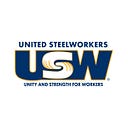Workers Need More Allies Like These
By David McCall
USW International President
James Evanoff began earning a pension while working at a UPS warehouse in 2001 and continued adding to it when he switched to a job at a small chemical company in suburban Cleveland.
But then a wave of insolvency roiled multiemployer pension funds, threatening to wipe out everything that he and 1.3 million other workers nationwide had spent years — in some cases, decades — building.
Fortunately, U.S. Sen. Sherrod Brown of Ohio stepped forward with an unshakable resolve to save their retirements. He spent five years fighting for legislation to shore up the failing plans and ultimately pushed the bill over the finish line in 2021 without a single Republican vote.
Among the 535 members of Congress, only a handful stand with working people so faithfully, and so passionately, that they’re considered part of labor’s family.
Brown is one of them.
“My opinion is, he’s the working people’s champion,” said Evanoff, now a member of United Steelworkers (USW) Local 979 who works at the Cleveland-Cliffs mill in Cleveland. “There’s no other way to describe him. He cares about working people, not big business.”
This year alone, Brown joined the USW’s effort to rebuild the domestic shipbuilding industry, helped to secure duties on several countries unlawfully undercutting U.S. shopping bag producers, and urged new limits on imports of oil country tubular goods to support workers in Ohio and Pennsylvania.
And by assailing China’s scheme to dump steel in U.S. markets via Mexico, he’s working to preserve jobs at Evanoff’s mill and others like it.
Just as important, Brown understands that workers need not only a good paycheck but a seat at the table and safe working conditions. He’s a top proponent of the Protecting the Right to Organize (PRO) Act, a USW-backed bill that would empower more workers to form unions, and his advocacy with federal safety agencies continues to protect workers from cancer-causing silica and other workplace hazards.
While grateful for the senator’s work on many issues, however, Evanoff cites Brown’s rescue of the pension plans as a particularly powerful example of his compassion, tenacity and leadership.
About 130 pension funds, all combining obligations from multiple employers, began collapsing more than a decade ago because of corporate bankruptcies, Wall Street failures, industry deregulation and other factors outside workers’ control.
Evanoff was relatively young at the time, so his pension represented a measure of financial freedom, affording him the means to retire early or indulge hobbies during his golden years. But older workers faced much grimmer scenarios: Losing that income — income they’d already earned, Evanoff pointed out — would have forced some to delay retirement or work until death.
Brown introduced a bill to save the pensions in 2017, only to see it die in a Republican-led committee. He reintroduced it in 2019 and again in 2021, finally achieving passage despite callous opposition from some of the same Republicans who handed out billions to bail out Wall Street during the mortgage crisis.
“He could have just moved on,” said Evanoff, recalling Brown’s persistence.
“He could have said, ‘We’re never going to get this done.’ But he said, ‘No, this is the right thing to do. We’re going to do it.’ He kept fighting for us,” said Evanoff, noting Brown saved the pensions of more than 100,000 Ohioans alone — plant workers, truck drivers, and ironworkers among others.
Unions and their allies stand between workers and the 1 percenters eager to exploit them.
When the prices of groceries and other items increased in the wake of COVID-19, for example, supermarkets and other companies blamed supply chain problems.
But U.S. Sen. Bob Casey of Pennsylvania knew better and took supermarkets and food manufacturers to task for the price-gouging at the root of the increases. Casey, a staunch friend of working families, issued a report showing how stores not only raised prices astronomically but shrunk package sizes to line their pockets at consumers’ expense.
“It’s the CEOs and the top corporate people raking in all the money. That’s what is driving it,” noted Dave Harvey, a member of the Steelworkers Organization of Active Retirees (SOAR) who worked at the Du-Co ceramics plant in Saxonburg, Pa. “They’re hiding behind the pandemic.”
Like Brown, Casey supports the PRO Act. But he also went further and introduced the No Tax Breaks for Union Busting Act, a bill that would prevent corporations from writing off the costs they incur attempting to thwart union drives.
While working to hold corporations accountable, Casey also stands at the forefront of efforts to create jobs and grow the middle class.
The Infrastructure Investment and Jobs Act delivers $1.2 trillion for roads, bridges and other projects while creating new demand for American-made steel, glass and other manufactured goods. Casey’s crucial vote on that bill now helps to provide millions of workers with the kind of job security that Harvey wishes he had during his decades in manufacturing.
In addition, Casey called for giving the Commerce Department more tools for fighting unfair trade, such as power to wield against companies that try to mask illegal shipments of goods by routing them to the U.S. through other countries. And he’s proven himself a tireless supporter of the Trade Adjustment Assistance program, which Republicans killed even though it helped displaced workers start over.
“He identifies with working people and the needs that they have. He realizes the problems they face every day,” explained Harvey. “He’s attuned to that.”
There’s nothing workers like less than being forced to go on strike for fairness and dignity on the job. It is those very same times, however, when union members find out who’s really in their corner.
Both Brown and Casey have walked picket lines, demonstrating their integrity and providing support when workers needed it most.
“They’re walking the walk, not just talking,” Harvey said. “We need more of our elected officials to do that.”
